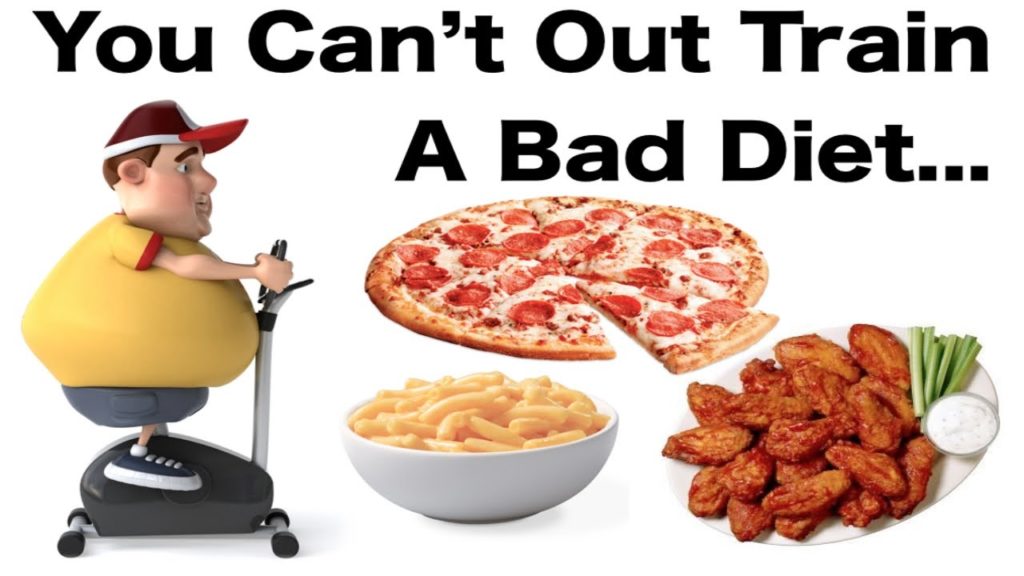It’s common in the fitness space to hear the phrase, “you can’t out train a bad diet.” I know I’ve said it many times. But is it true? First off, what does it mean to out train a bad diet? In most cases, it means that people eat whatever they want – plenty of processed food, refined carbohydrates, added sugars, alcohol, etc., and perform enough exercise to either not gain weight, or actually lose weight. So, is this possible?
To answer the answer this properly, we refer to the calorie balance equation. Decreases in body stores are only possible if we expend more energy than we take in. In other words, are we burning more calories than we’re absorbing? We don’t absorb all the calories we ingest for various reasons. Furthermore, there is an upper limit to how many calories we can absorb in a day.

This limit is based on our basal metabolic rates. What’s a basal metabolic rate (BMR)? It’s the number of calories we would burn lying in bed all day, doing absolutely nothing. It’s based on a number of factors, but size is a pretty good indicator. For example, a 6 foot tall, 230 lbs male would have a BMR of about 2000 calories. The most calories we can absorb in a day is 2.5-3 times our BMR. In the case of our 230 lbs male, that means 5000-6000 calories is his upper limit. For most people, BMRs, and correspondingly, the max calories they can absorb, are significantly lower.
[This is good news during the holidays. If you have a day of serious binging – it won’t affect your weight long-term. Repeated bouts of binging is a different story.]
Now for the calories out piece – we burn calories in 4 ways:
- Basal metabolic rate
- Exercise (most people and tracking devices GROSSLY overestimate this)
- Non-exercise activity thermogenesis (aka NEAT, things like walking during work, yard work, fidgeting, typing, manual labor, etc.)
- Thermic effect of food – it takes energy to digest food
Most of the calories we burn comes from BMR. Exercise contributes for people who do it regularly, but not as much as we think. Lifting, interval training, CrossFit, etc. – these burn maybe a few hundred calories. The most effective way to burn calories through exercise is with a sustained, long, output. In other words, cardio. If we go back to our 230 lbs male – if he ran 8 miles in an hour (a 7:30 mile pace), he would burn 1200 calories in that hour. Going back to his BMR of 2000 calories, we can calculate that 2000 calories per day / 24 hours per day is 83.3 calories per hour. Burning 1200 in an hour is almost 15 times his BMR. That’s huge. But, it’s also not possible to sustain that kind of output over time. For example, the record for mileage in a 24 hour race is 180. That yields an output of 17,000 calories burned in that day, which, for the record holder amounts to 11.4 times his BMR. Looking at multi-day endurance events (Tour de France, etc.), athletes burn energy at 7-8 times their BMR.
What’s with all the math? It shows us that it’s possible to burn calories at rates significantly faster than we can absorb them. If our 230 lbs male performed 10 hours of exercise at a multi-day endurance event, he would burn at minimum, 6000 calories, the most he could absorb in a day. This shows that it is POSSIBLE to out train a bad diet.
The better question is, is it practical? How many of us have 10 hours a day to dedicate to training? Even if we ramp up the intensity and perform sustained, higher output work, it would still require several hours to match the maximum we can absorb in a day. Now imagine trying to do this multiple days in a row. Most of us are not professional athletes, and we’re lucky to dedicate an hour a day, if that, to training. And, that training session includes multiple pieces – a warm-up, maybe some strength work, conditioning, and a cooldown. Trying to out train a bad diet is impractical for most of us.
Given that there are 24 hours in a day, and we spend maybe 1 hour training, what happens in the other 23 hours is going to have the biggest impact in our health and fitness. All of our meals are part of that 23 hours. It’s difficult for that 1 hour to undo any damage done in the 23. Therefore, even though it is theoretically possible, we maintain that you can’t out train a bad diet.
